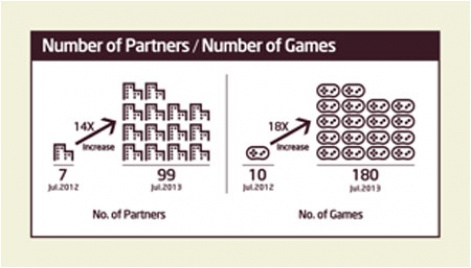As a paid advertising platform for mobile apps and games, it's currently the go-to-company for western publishers' marketing dollars.
According to its Q1 2013 financials, its advertising channels pushed over 25 million downloads from 3,800 developers and publishers, and that's just the start.
Now it's getting into the app publishing business too.
What's big in Japan
The background to Facebook's move is a global rise in the power of social networks to push mobile games.
Most notably demonstrated by the rise of KakaoTalk in Korea, mobile-focused social mobile networks in Asia are growing very, very quickly.
Kakao has over 100 million users, LINE is over 150 million, and WeChat is over 400 million, and the frequency of use is massive - mirroring the use of SMS in the west.
And it's the combination of reach, frequency of use, and the way people are using the very casual games offered to compete - via leaderboards which are refreshed weekly - and cooperate - gifting etc - that's providing such a large opportunity.
In Kakao's heartland of Korea, the company recently announced that 180 titles from 99 developers were live on its games platform. That's up from 10 games from 7 developers in July 2012.
It's a similar situation in Japan where LINE rules the roost, and Chinese developers are looking forward to Tencent launching its WeChat games platform during August.
Know your limits
Of course, Facebook isn't particularly strong in Asia, so this doesn't really impact its business, yet.
But Kakao and LINE are expanding internationally, and both already have strong user bases in recessionary Spain, where people are switching from paid mobile services to free wifi services. WeChat has over 70 million users outside China.
Nevertheless, Facebook's move into publishing is more about it extending its services, and generating more revenue.

What it must be aware of, however, is the difference between distribution - a bulk and uncurated service - and publishing - a boutique and curated service.
Trying to create a bulk, curated service is doomed to failure.
Little but big
Because, looking at its launch line-up, and it's not clear Facebook does understand the distinction.
For one thing, it talks about "Facebook Mobile Games Publishing, a new pilot program to help small and medium-sized developers take their mobile games global".
But if we look at the 10 launch partners, Gameloft, Dragonplay, Gamevil and WeMade are certainly not small and medium-sized. Three of them are publicly-owned, while Dragonplay is a large publisher of casino games.

New game from a small French start-up called Gameloft
Even 5th Planet is stretching the definition, given its strong web-gaming business.
The road to hell
What's more interesting is that Facebook will promote these titles to its 800 million monthly users - also collaborating with developers in terms of analytics and expertise - in exchange for a revenue share.
Obviously, we don't know the exact details, but this looks very much like the model used by Kakao. It get 30 percent of all the revenue generated on its platform.
And, as demonstrated by Kakao, the longterm problem is because it's very difficult to work out which games will be hits, the temptation is push more and more games through the channel. That's how you end up making the most money.
For example, when Kakao launched, it released one or two games weekly, enabling them to build an audience.

Now, however, five or six games are released each week, with the result that games have a matter of days to gain traction. Certainly, breakout hits such as Devsisters' Cookie Run are still being made, but this is now the exception, not the norm.
After all, there are only so many games people can play.
Colours to the mast
That's why if Facebook wants to remain true to its stated publishing model, it needs to restrict the number of games it pushes through its channel.
And if it really wants to be honest and help developers who don't have resources, it should also impose a revenue cap, only working with companies who have annual sales of - say - less than $5 million.
Anything else will likely just dilute into a 'publishing-in-name-only' bulk distribution model.
Still useful for the mobile games industry for sure, but not something that can be marketing as helping those "who don't yet have the upfront resources for a paid strategy".






















